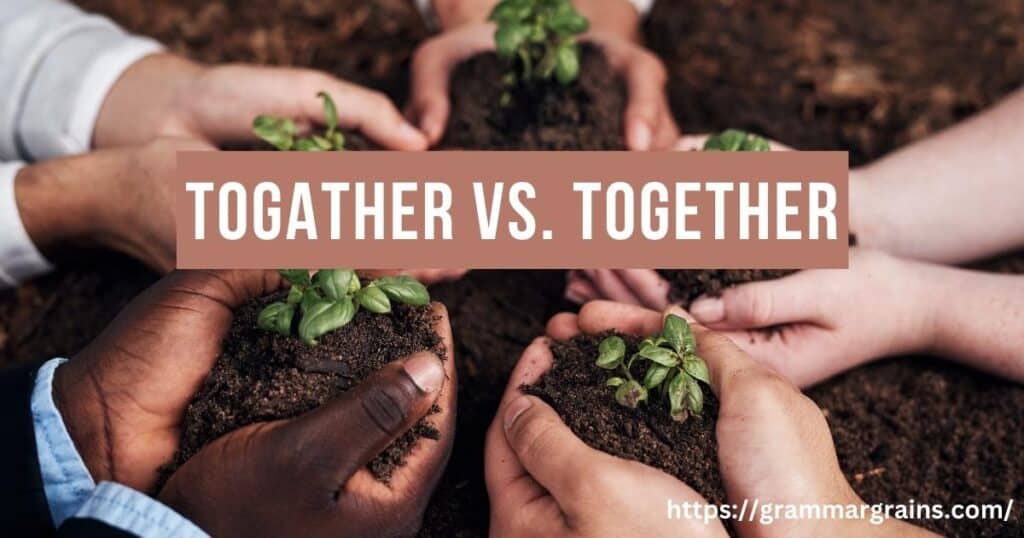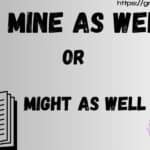Togather vs together is a common confusion in English. Many people mistakenly use togather instead of the correct word, together. This small spelling error can make your writing look unprofessional.
Understanding the difference between togather and together is essential, especially if you’re writing for a global audience.
Let’s explore how to use together correctly and why togather is always incorrect.
The confusion between togather or together

Spelling is an essential part of clear communication.
A small mistake like confusing togather vs together can change how your writing is perceived.
Many words in English sound similar, and this leads to misspelling.
However, learning the correct usage is easier when broken down step by step.
Proper spelling not only enhances clarity but also builds trust in your message. The confusion between togather or together stems from the phonetic similarity of the words. While “gather” is a valid term, adding “to” before it creates an entirely incorrect form.
This guide will help you avoid such errors and use the proper spelling every time.
Why Spelling Matters in Communication
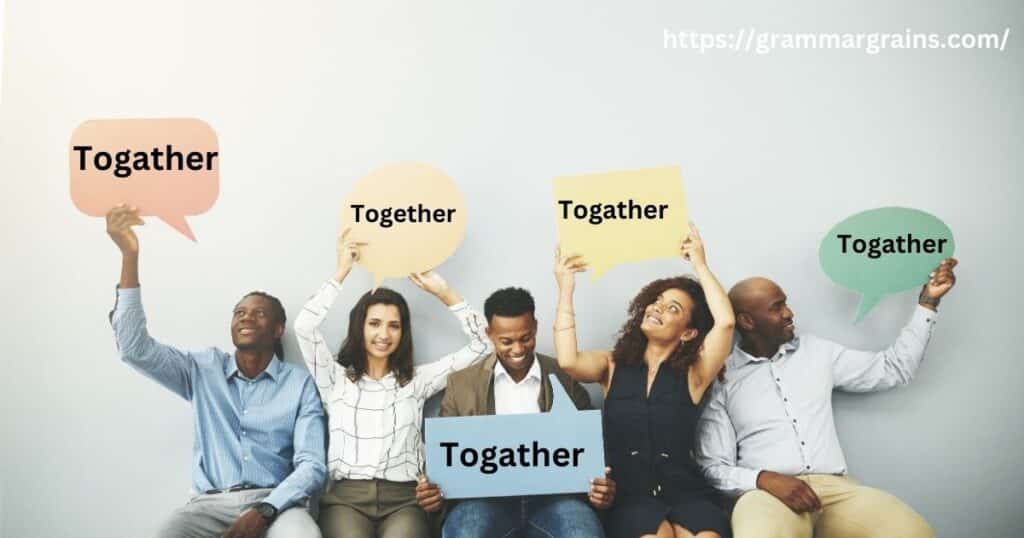
Good spelling is essential for maintaining professional credibility.
Imagine sending an email with “togather” instead of “together”.
The error might seem small but could leave a lasting impression on the reader.
Mistakes like these undermine the effort you put into creating a message.
Correct spelling also ensures your audience stays focused on the content rather than the mistakes.
Studies on writing effectiveness reveal that readers judge credibility based on grammar and spelling accuracy.
Inconsistent spelling not only distracts but also lowers your authority as a writer.
Even social gatherings, like those labeled “get togather” by mistake, can seem less organized.
This is why paying attention to details matters.
Understanding “Together”
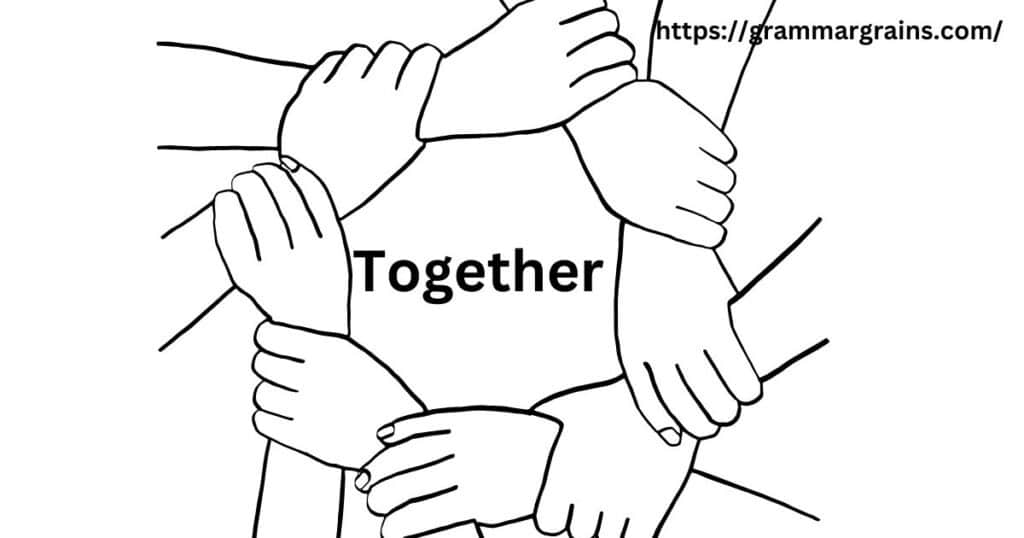
What Does “Together” Mean?
The word together means “in unity” or “in one place.”
It can also describe cooperation or physical closeness.
For example, “We worked together on this project.”
This word emphasizes unity and collaboration.
In many contexts, it is used to show shared effort or mutual support.
Understanding the togather together difference helps in avoiding common errors.
While togather has no meaning,
“together”
expresses a strong sense of community and joint action.
It’s essential for describing relationships and collective experiences.
Together in Action
“Together” also has powerful emotional implications.
It symbolizes unity in personal and professional relationships.
For example, couples often say,
“We are stronger together.”
This illustrates how one word can convey both physical and emotional closeness.
Recognizing its duality ensures you use it meaningfully in your writing.
Together as an Adverb
As an adverb, together describes actions performed jointly.
For example, “Let’s study together for the exam.”
Here, it explains the manner in which the action takes place.
Adverbs like “together” are key in making sentences more descriptive.
Get together is another example of how “together” functions.
This phrase implies a social gathering or a reunion.
“Let’s get together for a party”
showcases its usage in casual contexts.
Together as an Adjective
In rare cases, together functions as an adjective.
It describes someone who is organized or in control.
For instance,
“She is a very together person.”
This usage is less common but still valid.
It reflects confidence and composure in an individual.
Etymology of “Together”
The word together has roots in Old English, derived from “togeædere.”
Over time, it evolved in spelling and meaning.
This historical journey makes it clear why similar-sounding words like togather may seem plausible but are incorrect.
Its origins highlight the unity and collaboration implied by its use today.
Pronunciation and Phonetics
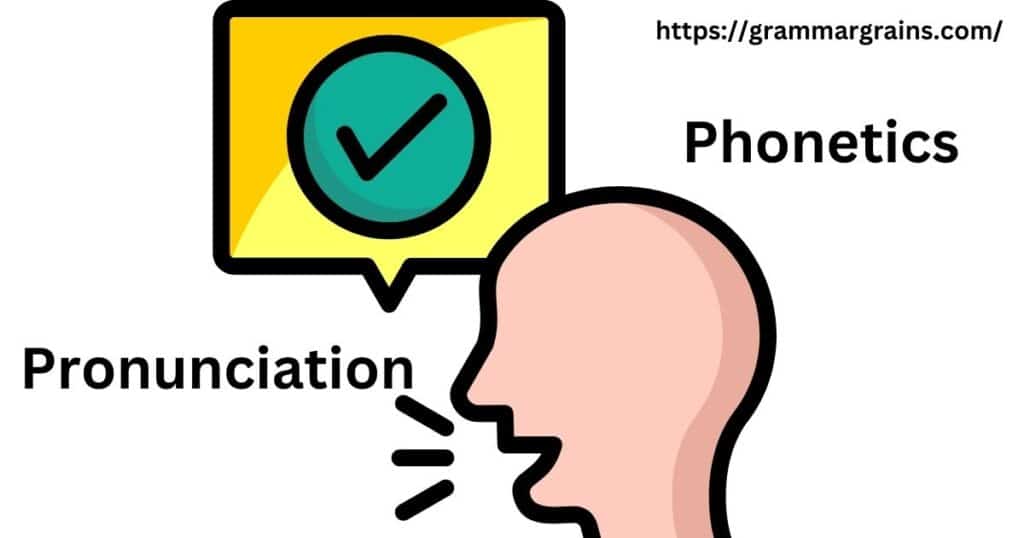
How to Pronounce “Together”
The pronunciation of together is straightforward: /təˈɡɛðər/.
The stress falls on the second syllable.
Practice saying it slowly to master its rhythm.
Mispronunciation often leads to misspelling, so focusing on clarity is crucial.
Phonetics of “Together”
Phonetically, together consists of three syllables:
“To” + “geth” + “er.”
The smooth transition between sounds often leads to errors like togather.
Practicing the phonetics ensures accurate usage.
| Syllable | Sound | Example Word |
|---|---|---|
| To | /tə/ | To |
| Geth | /ɡɛð/ | Gather |
| Er | /ər/ | Water |
Common Mistakes and Misspellings
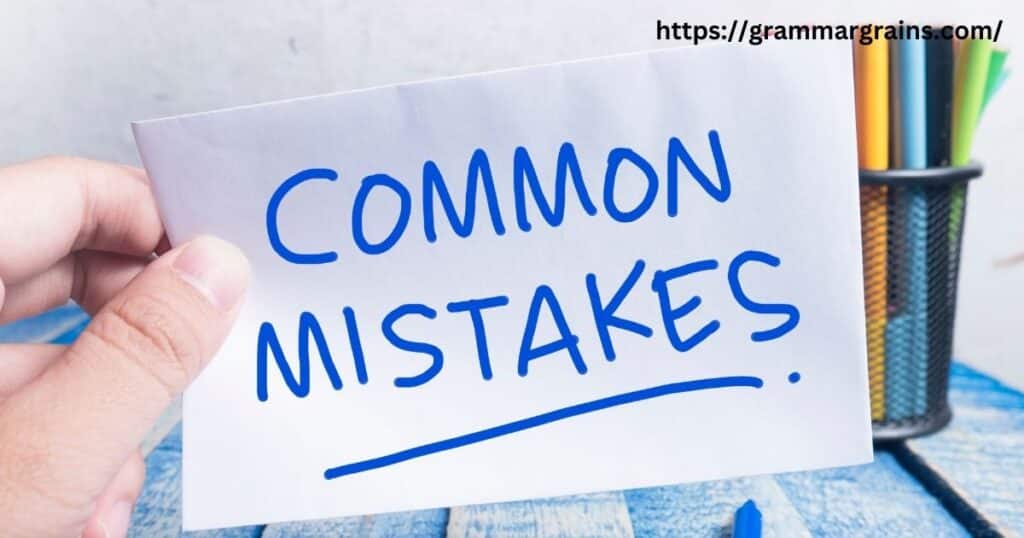
Why Would We Misspell “Together” as “Togather”?
The misspelling “togather” happens due to phonetics.
The word “gather” in English influences how people type “together.”
Additionally, fast typing or lack of focus often causes such errors.
Understanding this helps eliminate the habit of writing “togather.”
Other Common Misspellings of “Together”
Some other misspellings include “togetther,” “togeather,” and “togetha.”
These mistakes occur due to similar reasons, including phonetics or hurried writing.
They reflect a need for better focus and proofreading.
Example Sentences of the Misspelling of “Together” as “Togather”
Incorrect:
“We need to work togather on this task.”
Correct:
“We need to work together on this task.”
Spelling Tips and Proofreading
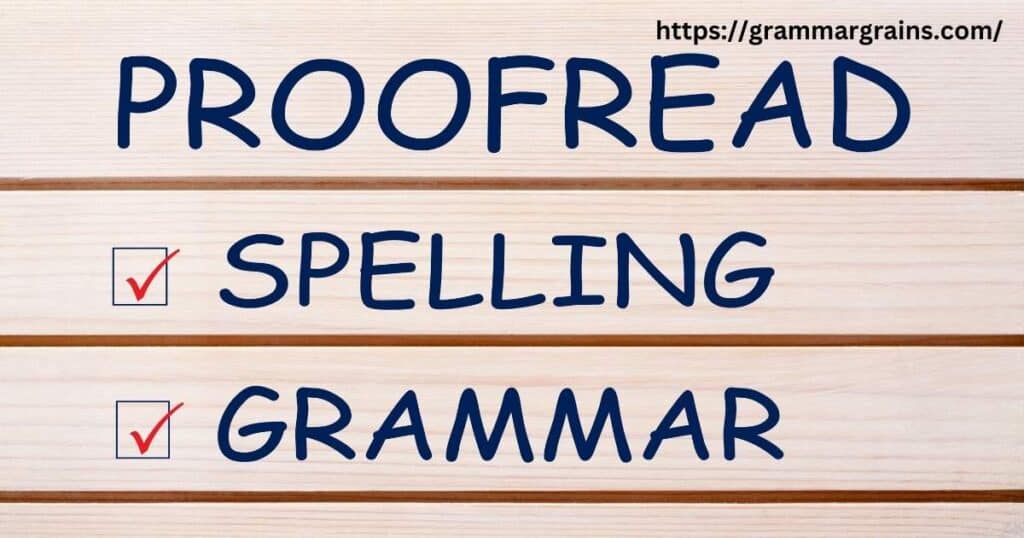
Tips for Avoiding Spelling Errors
- Remember: There is no “a” in together.
- Break the word into syllables: “To” + “gether.”
- Use mnemonic devices like “Two get her.”
- This can help you remember the correct form.
Common Spelling Errors
Misspelling words is common, especially with homophones or similar-looking words. Mistakes like “togather” happen often because people confuse sound with spelling. It’s critical to review your work thoroughly.
Tips for Proofreading
Proofreading is essential to catch errors.
Reading aloud helps identify mistakes.
Tools like spell-checkers assist but should not replace manual checks.
Try reading backward, sentence by sentence, to focus on each word individually.
Usage and Examples
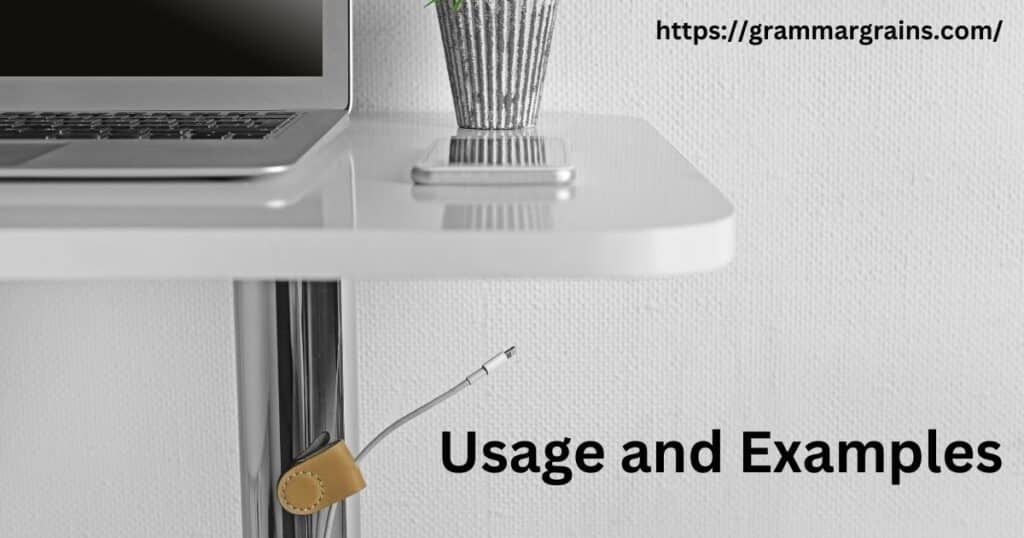
Example Sentences of “Together”
- “We came together for the celebration.”
- “The team worked together to win the game.”
Usage Examples in Everyday Scenarios
Together can be used to describe teamwork or social gatherings. For instance, “We’ll get together this weekend for a reunion.” Such usage highlights cooperation and unity.
Phrasal Verbs with “Together”
- Bring together: “The leader brought the community together.”
- Come together: “The plans are coming together well.”
Idioms Related to Unity
- “Stick together through thick and thin.”
- “Pulling it all together.”
Synonyms and Related Expressions
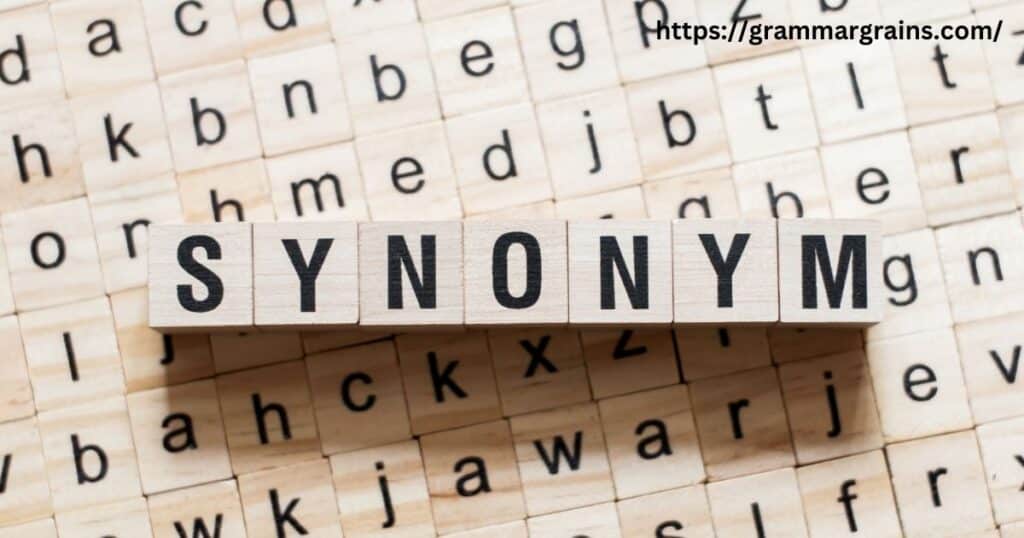
Synonyms for “Together”
Synonyms include united, jointly, collectively, in unison, and cooperative.
These words convey similar meanings, emphasizing unity.
Idioms and Expressions That Emphasize Unity
Phrases like
“hand in hand”
and
“as one”
are popular expressions that highlight collaboration and unity.
Conclusion
Understanding the difference between togather and together is crucial. Spelling errors like togather can confuse readers and reduce credibility. Learning tips to avoid such mistakes ensures clarity and professionalism in communication.
Mastering correct spelling takes time but pays off in building trust. Always proofread and practice using words accurately.
FAQs
- Why is “togather” incorrect?
- “Togather” is a misspelling of the correct word “together.”
- What are tips for remembering the spelling of “together”?
- Break it into syllables: “To” + “gether.”
- What is the difference between “togather” and “together”?
- “Togather” is an incorrect spelling, while “together” is correct.

Taila Lucy, an expert content writer at Grammar Grains, brings 4 years of experience crafting engaging pieces on grammar. Her work delves into synonyms, antonyms, slang, puns, and poetry, helping readers master English with creativity and flair.
